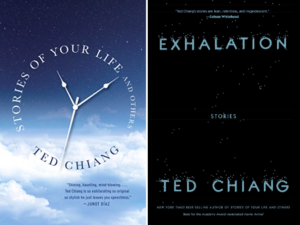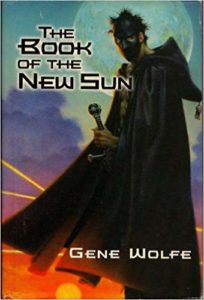
Are you here for the sexcapades or the sci-fi? Either way, we’re happy to have you.
First, we turn our attention to the Washington Post, where Ron Charles dubbed Fleishman Is in Trouble—Taffy Brodesse-Akner’s debut novel of recently-divorced New York doctor navigating online dating and his ex-wife’s disappearance—”a book that makes you laugh so hard you don’t notice till later that your eyebrows have been singed off.”
Over at the Times Literary Supplement, SFF titan Neil Gaiman penned a lovely tribute to the late, great Gene Wolfe, calling Wolfe’s The Book of the New Sun, “a hymn to memory, a Borgesian labyrinth crafted into a whole world, a sequence of mirrors and reflections that allow us to travel the universe of a dying Earth that may live again.”
And while we’re on the subject of SFF titans, in an intriguing New York Review of Books essay on the short story collections of Ted Chiang (Stories of Your Life and Others and Exhalation), Caleb Crain writes: “it’s rare to find a writer capable of assimilating them into the flesh and bone of story. Often one element is noticeably compromised: the ideas are watered down, or the story is sensational rather than deeply felt, no more than a soap opera or a boy’s adventure. Ted Chiang has the powers of analysis and invention necessary for the alchemy.”
We’ve also got Katy Waldman on Mark Haddon’s feminist reimagining of Pericles, The Porpoise (“These quick recalibrations—from contemporary realism to suspense to epic—convey bravura, a giddy sense of possibility, a love of story”) and Chelsey Johnson’s New York Times review of Nicole Dennis-Benn’s “story of self-made queer survival,” Patsy (“this subtle motif beautifully illustrates how the characters are connected to one another by love, desire and violence, and how they bear those histories permanently, both within and on their bodies.”)
*
“Taffy Brodesser-Akner brings to her first novel the currency of a hot dating app and the wisdom of a Greek tragedy. The result is a feminist jeremiad nested inside a brilliant comic novel—a book that makes you laugh so hard you don’t notice till later that your eyebrows have been singed off … Brodesser-Akner demonstrates an anthropologist’s thoroughness in her study of contemporary adult dating and its catalogue of sexual practices, but her prose, ringing with manic energy, is obscenely funny. She seems equally amused and horrified as she traces the pixels of lust and humiliation flitting across social media … Perhaps every engaged couple should read this book before they tie the knot—the way amateur skydivers must sign a liability release that states: ‘You May Be Seriously and Permanently Injured or Killed.’ With merciless precision, Brodesser-Akner traces the arcing trajectory of doomed affections: the glorious takeoff, the deluded calm, the shrieking descent … Brodesser-Akner swings the sword full circle, slicing through the demeaning rules of the patriarchy just as effectively as she slays the fatuous optimism of that ‘girl-power’ propaganda fed to modern girls … Conveying the full tragedy of that predicament in a story that’s often blisteringly funny is the real triumph of this book. Few novels express so clearly that we’re all in trouble.”
-Ron Charles on Taffy Brodesser-Akner’s Fleishman Is in Trouble (The Washington Post)

“In the right hands, ideas expand the possibilities of fiction. Unfortunately, it’s rare to find a writer capable of assimilating them into the flesh and bone of story. Often one element is noticeably compromised: the ideas are watered down, or the story is sensational rather than deeply felt, no more than a soap opera or a boy’s adventure. Ted Chiang has the powers of analysis and invention necessary for the alchemy … Is the control a mere demonstration of skill, or does it have a deeper significance? The voice in the stories is never personal, and it’s difficult to pinpoint exactly where, in any of them, Chiang himself seems to be writing from. It’s possible that he regards the world as a somewhat remorseless pattern, and his personal self as no more than a component of it … A story wouldn’t engage us if we didn’t feel that it had a moral significance even though it wasn’t real. And if a story helps us through a deliberation, we owe something to it even though its events didn’t take place in our universe. Considered in this light, multiple selves and speculative responsibilities turn out not to be all that abstruse; what Chiang has done is take the idea of fiction seriously.”
-Caleb Crain on Ted Chiang’s Stories of Your Life and Others and Exhalation (The New York Review of Books)
“These quick recalibrations—from contemporary realism to suspense to epic—convey bravura, a giddy sense of possibility, a love of story. Have we entered a zone of gods and monsters, or simply men? Haddon declines to resolve such ambiguities. He is working from rich, if messy, source material … The Porpoise is terrifically violent, with a bright, innocent ferocity. When Pericles imagines pulling his ‘long wet blade’ from the chest of a fallen foe, a stern clarity animates both the act and the language. Descriptions of death are beautifully wrought and clinical—as one character suffers a heart attack, ‘two bracelets of fire’ travel ‘down his arm as if someone were peeling the skin from shoulder to wrist.’ These formally striking passages feel intentionally divorced from any understanding of the human body as a site of suffering. Written from a kind of artistic absolute zero, they scan like the announcements of an insane person or a god. In The Porpoise, such impersonal aesthetic cruelty is the province of women. Stories are the province of women, too: Haddon wants to restore agency to the female characters sidelined by the Antiochus legend. This could feel like a condescending attempt to end up on the right side of history, but doesn’t—the characters are never reduced to props in a you-go-girl power ballad … Haddon’s book is almost more evocative of pre-stories: of the phase before the story is told, when it is still indeterminate, unbound from words.”
-Katy Waldman on Mark Haddon’s The Porpoise (The New Yorker)

“I revisit The Book of the New Sun once a decade, and I learn more about the art of reading it. And what I bring to reading it makes the experience deeper, brings the story more precisely into focus, clarifies and delights. Gene defined good literature as ‘literature that could be read with pleasure by an educated reader, and reread with increased pleasure,’ and this is so true of The Book of the New Sun. Your first journey through brings pleasures, brings story, brings Severian. Future journeys make it better … The more deeply you delve into the book, the more it will repay the delving. There are no digressions, no matter how much it appears that there are: each small journey is the huge journey, as a hologram contains the whole picture in each fragment. Gene Wolfe is not an unsung writer, but he is not yet as well nor as widely sung as he should be. There are awards to celebrate writers this good that Gene has not received: the big ones from the academies and the ones with National in the title. And he is as good as anyone who has received these awards in the past. Wolfe is, however, lauded and appreciated and has been given a cornucopia of awards by the world of Speculative Fiction. We know how good he is and how lucky we are to have had him. The Book of the New Sun is both the most remarkable SF work of the past five decades, and the nearest thing SF has come to its own À la recherche du temps perdu. It’s a hymn to memory, a Borgesian labyrinth crafted into a whole world, a sequence of mirrors and reflections that allow us to travel the universe of a dying Earth that may live again.”
-Neil Gaiman on Gene Wolfe’s The Book of the New Sun (Times Literary Supplement)
“Nicole Dennis-Benn carefully unspools the stories behind each wound over the long course of this richly imagined novel, her second; their provenances emerge gradually, piece by piece, the way a person’s story of trauma emerges only with time and trust. Without giving those stories away, I’ll simply say that this subtle motif beautifully illustrates how the characters are connected to one another by love, desire and violence, and how they bear those histories permanently, both within and on their bodies. One of the novel’s finest achievements is how vividly and insistently the body shapes not just character but plot … this is a story of self-made queer survival, with ample pleasure alongside the pain and sacrifice, and of severing familial ties in order to save one’s own life, no matter the cost … Patsy weaves confidently through the characters’ physical and social worlds, but when it comes to Patsy’s emotional interiority, the prose occasionally goes overboard in conveying the potency of her feelings; these descriptions can feel excessive in scenes whose high stakes Dennis-Benn otherwise crafts so nimbly. This is a minor gripe for a novel that continually and subtly defies predictability as it tells a vital and remarkable life story … Again and again, Patsy surprises and illuminates.”
-Chelsey Johnson on Nicole Dennis-Benn’s Patsy (The New York Times Book Review)

